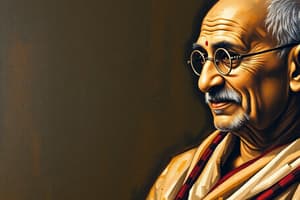Podcast
Questions and Answers
What concept did Mahatma Gandhi introduce to India's nationalistic movement?
What concept did Mahatma Gandhi introduce to India's nationalistic movement?
- Revolutionary Violence
- Military Confrontation
- Satyagraha (correct)
- Civil Disobedience
Where did Mahatma Gandhi study law which later influenced his involvement in India's nationalistic movement?
Where did Mahatma Gandhi study law which later influenced his involvement in India's nationalistic movement?
- Germany
- United States
- England (correct)
- Russia
What event prompted Gandhi's awakening to the struggles of Indian communities abroad?
What event prompted Gandhi's awakening to the struggles of Indian communities abroad?
- Independence of India
- Civil War in India
- Partition of India
- Discrimination in South Africa (correct)
What was Gandhi's main goal in advocating for the use of peaceful protests?
What was Gandhi's main goal in advocating for the use of peaceful protests?
Which term is synonymous with Mahatma Gandhi's philosophy of non-violent resistance?
Which term is synonymous with Mahatma Gandhi's philosophy of non-violent resistance?
Which movement led by Gandhi was a response to the Jallianwala Bagh massacre?
Which movement led by Gandhi was a response to the Jallianwala Bagh massacre?
What was the core focus of Gandhi's Civil Disobedience Movement?
What was the core focus of Gandhi's Civil Disobedience Movement?
Which group did Gandhi champion the rights of during his leadership?
Which group did Gandhi champion the rights of during his leadership?
What key principles did Gandhi emphasize that have shaped India's cultural identity?
What key principles did Gandhi emphasize that have shaped India's cultural identity?
What impact did Gandhi's philosophy have on India's economic and social policies?
What impact did Gandhi's philosophy have on India's economic and social policies?
Flashcards are hidden until you start studying
Study Notes
Nationalism in India: A Historical Perspective on Mahatma Gandhi
Nationalism, a sentiment of strong identification with a nation and its citizens, has profoundly shaped India's modern history. And at the heart of this movement, whose quest for independence and unity culminated in the creation of the Indian republic, stands Mahatma Gandhi. This essay will explore the role of Gandhi in the formation and evolution of nationalistic ideals in India, examining his philosophies and actions.
Gandhi's Early Life and Involvement in Nationalism
Mohandas Karamchand Gandhi, later known as Mahatma Gandhi, was born in 1869 in a small town in India. Gandhi began his studies of law in England, received a British education, and later practiced as a lawyer in South Africa. During his time there, he faced discrimination and injustice, which sparked his awakening to the struggles of Indian communities abroad. Returning to India in 1915, Gandhi began his journey as a nationalist leader, tirelessly advocating for India's freedom from British colonial rule.
Satyagraha and Non-violent Resistance
Gandhi's greatest contribution to India's nationalistic movement was the concept of Satyagraha, a term loosely translated as "truth force" or "non-violent resistance." Satyagraha emphasized the use of non-violent means to pursue justice and fairness. Gandhi's belief was that through peaceful protests, they could achieve their nationalistic goals without resorting to violence. In fact, Gandhi's principles of non-violence played a crucial role in India's eventual independence and inspired movements globally, including the U.S. Civil Rights Movement.
Key Nationalistic Campaigns
During his tenure as a nationalist leader, Gandhi spearheaded several campaigns that played a significant role in India's struggle for liberation. Among these were:
-
The Non-cooperation Movement (1920–1922): In response to the Jallianwala Bagh massacre, Gandhi led a nationwide campaign of non-cooperation with the British regime.
-
The Civil Disobedience Movement (1930–1934): With the Salt March at its core, Gandhi's civil disobedience campaign was an act of resistance against the colonial salt laws, which restricted the production and sale of salt.
-
The Quit India Movement (1942): In response to the internment of Indian leaders and the escalation of World War II, Gandhi called for a mass civil disobedience campaign, urging the British to leave India.
Gandhi's Ideology and Principles
Gandhi's ideology significantly influenced India's nationalistic movement. He emphasized the importance of self-reliance, simplicity, and non-violent means of resistance, all of which have shaped India's cultural identity and national vision. Gandhi also championed the rights of the marginalized, including women and the underprivileged, and encouraged the use of traditional arts, crafts, and farming methods, which have continued to be vital to rural India.
Gandhi's Legacy
Mahatma Gandhi's philosophy and actions have had a profound impact on India and the world. His belief in non-violence and peaceful resistance has become a cornerstone of India's national identity. Furthermore, Gandhi's efforts to promote self-reliance and self-sufficiency have been influential in shaping India's economic and social policies.
In conclusion, the role of Mahatma Gandhi in the evolution of nationalism in India is undeniable. Through his philosophy of non-violence and his persistent advocacy for Indian independence, Gandhi has left an indelible mark on India's history and culture. As we commemorate his legacy, we continue to be inspired by his ideals and values, which have shaped the course of our nation and the world.
Studying That Suits You
Use AI to generate personalized quizzes and flashcards to suit your learning preferences.




